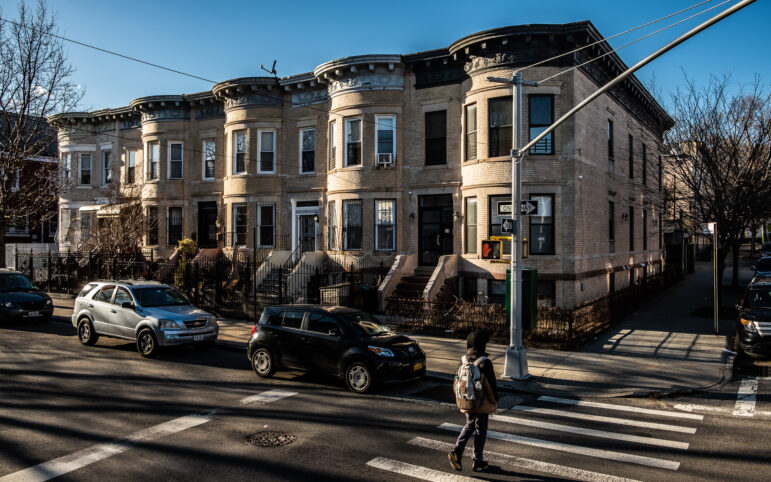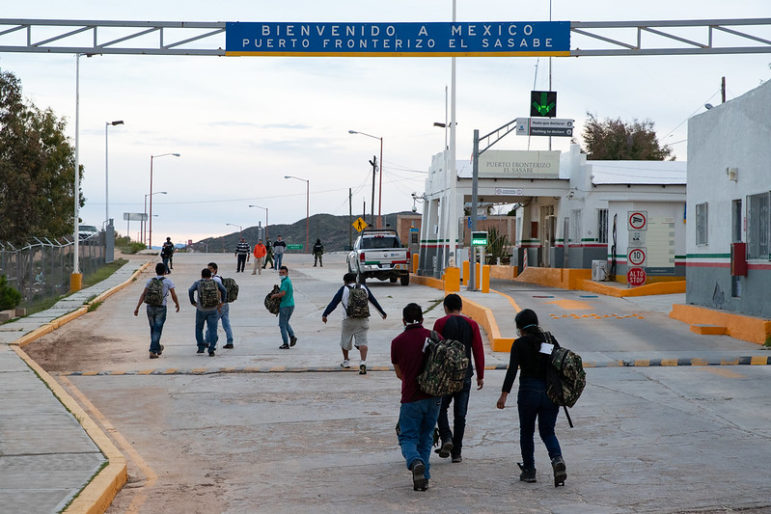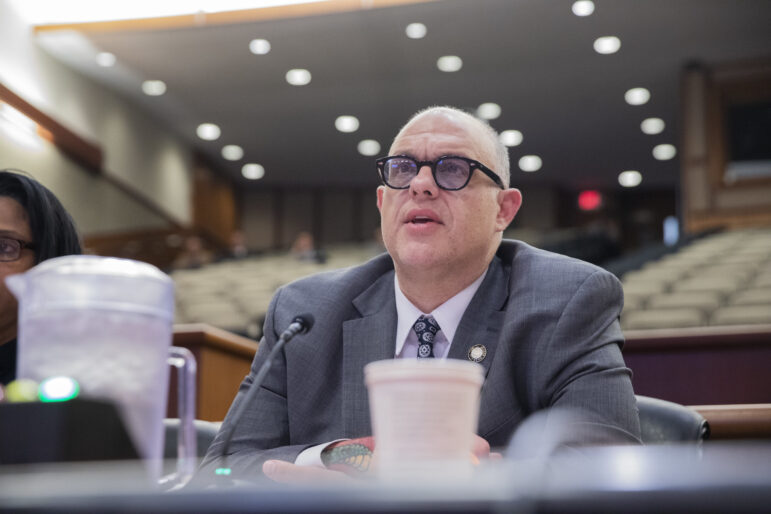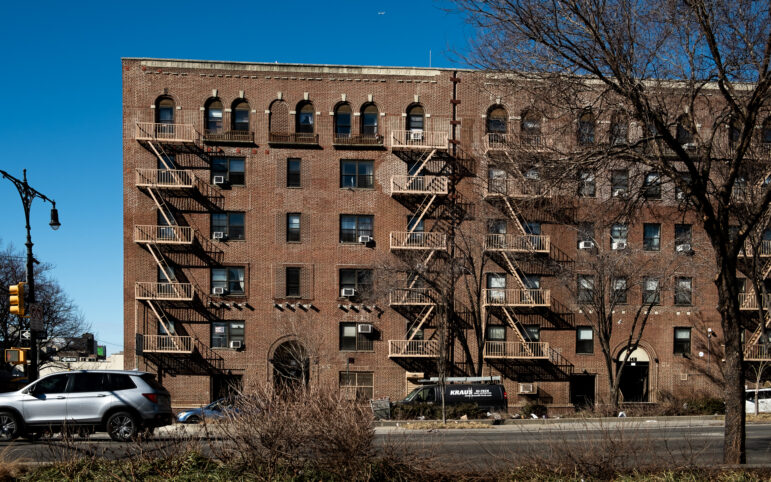Immigrant advocates say they would prefer to continue to work with New York Gov. Kathy Hochul, citing past accomplishments like the Excluded Workers Fund, and worry what a potential Lee Zeldin governorship would mean for their causes.
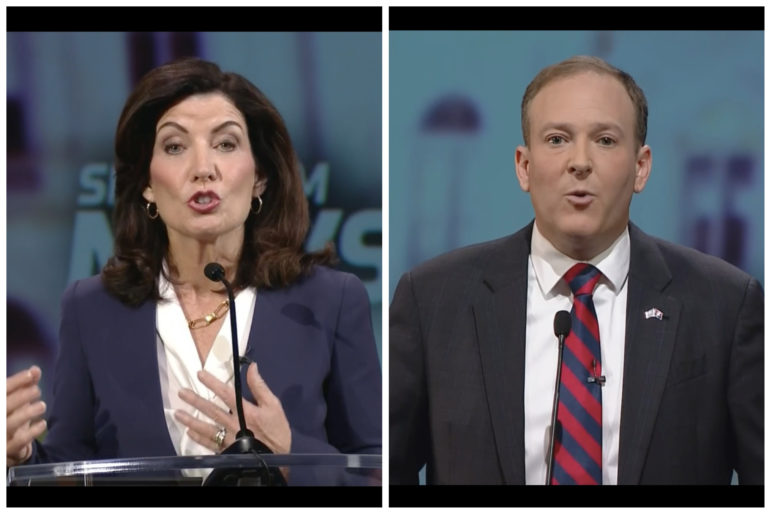
Screenshot/Spectrum News NY1
A screenshot of Zeldin and Hochul during last month’s debate on Spectrum News NY1.Election Day is Tuesday. Find your poll site and ballot information here.
Lea la versión en español aquí.
Even as more than 22,600 asylum seekers have arrived in New York City since the spring, the immigration issue is not prominently included on either of the New York City gubernatorial candidates’ campaign websites.
Despite New York City’s tapping more than 57 hotels to serve as temporary homeless shelters and and building a 1,000-person tent complex on Randall’s Island for single men asylum seekers, incumbent Gov. Kathy Hochul’s campaign site doesn’t mention immigration, and Republican candidate Rep. Lee Zeldin only has one line on the topic: describing how as congressman, he helped deliver “a $1.5 billion boost in border security resources, helping to choke off the flow of illegal migration across the U.S. borders.”
Advocates say the state’s next governor could have a serious impact on the lives of immigrant New Yorkers, and both the ideological gap and the actions taken by the two candidates are steep. Advocates fear they could lose whatever progress has been made on immigrant rights issues and programs should Hochul lose her seat, citing Zeldin’s past public statements on the issue.
“His campaign has been focused on fear and misinformation about everything, and immigration is no exception,” Murad Awawdeh said on behalf of New York Immigration Coalition (NYIC) Action, the NYIC’s political advocacy and action organization.
Neither candidate answered specific questions on the subject City Limits posed to their campaigns. During the only debate in the governor’s last month, both Zeldin and Hochul found some common ground in calling for the federal government to step up its role on immigration. But it was in their solutions to the problem where differences were most noticeable.
“This is a federal problem,” Hochul said in response to a question about whether she had communicated with the Republican governors of Texas and Florida, who in recent months have sent thousands of asylum seekers from the southern border to New York as part of a political stunt protesting President Biden’s immigration policies.
“But why can’t we do the processing and start them on the path to asylum at the border instead of sending them all over the state where they have no connections,” Hochul said. She added that she has supported Mayor Eric Adams’ effort to aid asylum seekers arriving at the Port Authority, as well as the use of MTA buses, both under the helm of the governor.
Zeldin, on the other hand, repeated what he has said on previous occasions, deploying a common Republican strategy of linking immigration to crime and public safety. “It is not just about people coming from it [the border], it’s also about things like the illicit drugs that are coming, the sex trafficking, the labor trafficking,” said Zeldin.
New York immigration advocates fear that this type of pigeonholing will divide communities. In Staten Island, for example, where apparent tensions over immigrant arrivals have flared, activists like Yesenia Mata counter that immigrants are incredibly resilient, emphasizing that new arrivals are here to find work, not criminal activity, as evidenced by an uptick in participants at local job training programs.
Five organizations that offer free basic OSHA training in the city said they have waiting lists ranging from a few hundred to more than 500, totaling as many as 1,500 people on them. The number of people waiting across the city’s main day-laborer hubs, or “las paradas” as they are called in Spanish, has also increased.
When asked what he would do with the migrant crisis if he were sworn in, Zeldin said that even in an ideal scenario in which the governors and mayors of both parties agree and solve the issue today, “it gets worse tomorrow.”
“Unlike what was stated by my opponent, the surge is still continuing,” Zeldin said on the debate stage last month. “Support our customs and border patrol agents, stop incentivizing and rewarding illegal entry.”
Fact checkers, though, say the increase in illegal border crossings is more complicated than the numbers alone imply. Most recently, encounters between U.S. border patrol and immigrants from Venezuela alone dropped as much as 86 percent compared to the week before, when Department of Homeland Security (DHS) officials announced that the Trump-era policy known as Title 42—which allows agents to rapidly expel foreign nationals at the border—now applies to Venezuelans.
In terms of support for border patrol: Over the last nearly two decades, the budget for both U.S. Customs and Border Protection (CBP), and Immigration and Customs Enforcement (ICE) has nearly tripled, from $5.9 billion in Fiscal Year 2003 to a peak of $17.7 billion in FY 2021.
In August, when the stream of buses transporting migrants began arriving in the city from different parts of Texas, Zeldin and Congresswoman Nicole Malliotakis held a press conference just a few steps from the bus landing site in Port Authority. In it, the congressman laid out his vision on immigration: to finish the construction of the border wall, to end what Republicans call “capture and release” and to enforce the Remain in Mexico policy.
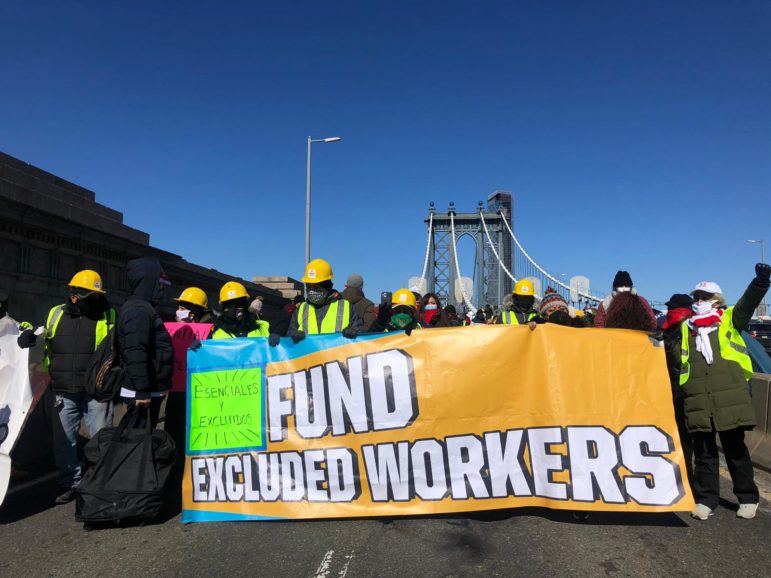
Courtesy Make the Road New York
Immigrant workers and advocates marched across the Manhattan Bridge in 2021, part of a successful campaign to get funding for excluded workers in that year’s state budget.
In New York specifically, Zeldin has called for repealing New York’s historic “Green Light” law, which grants undocumented people the right to obtain driver’s licenses, and has pushed to stop implementation of a law that would allow non-citizens to vote in certain local elections (a State Supreme court struck down the law in June, and the city is appealeing that decision).
“Voting is a sacred right of US citizens, and, today, the New York State Supreme Court correctly reaffirmed that right,” Zeldin said in a statement after the state court ruling “One person, one vote belongs to US citizens, and no one else!”
Hochul, for her part, has neither been seen as a leader on immigration issues, advocates say. She has taken a back seat to Mayor Adams in the situation with asylum seekers in shelter, though she cheered when the president reissued the Title 42 measures, saying she and the mayor had lobbied for it.
But immigration advocates give her credit on other fronts, including having created a unique program for undocumented victims of Hurricane Ida last year who otherwise would have not been eligible for recovery aid because of their immigration status (although only a portion of the fund has been used.)
Also to her credit, said Awawdeh, Hochul successfully implemented the Excluded Worker Fund, which provided COVID-19 aid to undocumented workers who didn’t qualify for federal assistance. She’s also extended language services by creating the New Office of Language Access, and expanded Medicaid eligibility for low-income undocumented New Yorkers aged 65 and up.
Advocates say they have an extensive list of additional requests and policy proposals that they would like to continue discussing and working with the governor to improve conditions for immigrants, and say a switch to the Republican side would be a major setback for their cause.
Make the Road Action, a political advocacy group that represents the interests of Latino and immigrant voters, has been knocking on doors on Hochul’s behalf.
“Voting on the [New York Working Families Party] line for Kathy Hochul is how we defeat MAGA extremist Lee Zeldin and stand up for our progressive values,” the group said on Twitter.


